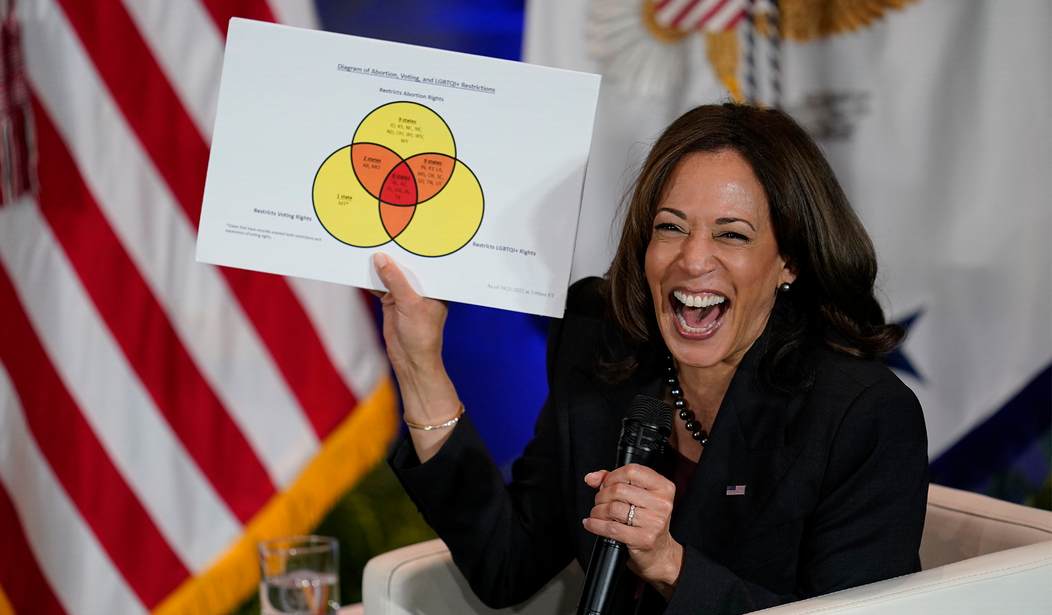Can Kamala Harris win? Based on polling right now and the media's
pervasive interference on her appalling record, she probably could. She
has erased the Democratic Party’s deficits in voter enthusiasm and
fundraising—for now. Yet Nate Silver tossed a hand
grenade into the middle of this parade since Democrats remain behind in
one crucial content: the Electoral College.
The popular vote does not matter, and when it’s this close, and
Donald Trump is the candidate—the advantage goes to the Republicans.
Silver then listed scenarios that could screw over or benefit either
candidate, but the fact is that Harris is getting a ‘she’s different’
bump in the polls. It’s not nearly enough to overcome Trump’s lead in
the Electoral College. The former president has a 61 percent chance of
winning this election. Silver then relays what factors he’s plugging
into his model (via Silver Bulletin):
…she’s
a modest underdog to Trump in the Electoral College, risking a repeat
of the popular vote-Electoral College split that cost Democrats the 2000
and 2016 elections. Harris isn’t unique in this regard: Biden also had a
large Electoral College-popular vote gap in 2020, barely winning
several tipping-point states despite winning the popular vote by 4.5
percentage points. But this is still a problem for Democrats, and we
show Harris as having a slightly wider popular vote-Electoral College
gap than Biden had in his version of the forecast.
[…]
Since
Harris isn’t president herself, she doesn’t get the same bonus that
Biden did. And we think that makes sense. Other things being equal —
that is, notwithstanding Biden’s terrible polling against Trump and
voter concerns about his age — you wouldn’t want to replace an elected
incumbent president who won the same matchup last time with his VP. So
whereas Biden was a roughly 2-point favorite in the popular vote in our
fundamentals model, it has the Harris-Trump matchup as almost an exact
tie in the popular vote. This could shift upward or downward in the
remaining days of the election based on the economic data the model
collects.
So basically, the model does this:
- Take the current polling-based snapshot, which shows Trump ahead by only 0.4 points.
- Adjust for the convention bounce, which puts Harris very slightly ahead.
- Regress
toward the fundamentals-based prior, which shows a tied popular vote.
(The prior currently gets 25 percent of the weight and it will fade to
zero by Election Day.)
That’s how we get to a forecast of
Harris winning the popular vote — although by only 0.6 percentage
points. However, as you can see, she’s not a favorite in the Electoral
College. Instead … drumroll … she has a 38 percent chance, compared to
61 percent for Trump and roughly a 1 point chance of no Electoral
College majority because of a 269-269 tie (or RFK Jr. earning some
electoral votes).
[…]
All things considered, this is a
respectable position for Harris. She’s almost drawn the race to a tie in
the states she’d need to win 270 electoral votes. And there’s evidence
that she’s winning back some demographic groups — particularly Black
voters and young voters — that had been abandoning Biden. That
particularly helps her relative to Biden in Georgia and North Carolina,
which have a substantial Black vote and a lot of college students and
young professionals — though the model is more skeptical of her ability
to compete in Western states like Nevada and Arizona.
However,
let’s not overstate the case. The problem with the Blue Wall strategy is
that Harris needs to win all three of Michigan, Wisconsin and
Pennsylvania (while also avoiding surprising losses elsewhere like New
Hampshire). Although these states’ outcomes are fairly strongly
correlated in the model, that’s still harder than winning just one. And
while Harris has a more viable path in Georgia and North Carolina than
Biden, she and the campaign still have their work cut out there.
Yet, it all circles back to the Electoral College, and that’s
breaking for the GOP. We live in a country where the system in which we
elect a new president rewards candidates with geographic
diversity—that’s Trump, whose coalition is very efficiently dispersed,
especially in areas where elections are decided. Harris is an inner-city
and coastal, snobby elites kind of gal. That’s not representative of
the country at all.
“I know people don’t like to talk about that
[the Electoral College], because there’s nothing that Democrats can do
about it. But the election is likely to be close, and it’s a big
disadvantage when the ties go to Republicans,” added Silver.
That
doesn’t bode well for Harris’ army of childless cat ladies. Yet, as the
Democrats sprint to define Harris, the Republicans need to regroup just
as quickly because the lack of messaging in attacking her will come
back to bite us. Her record alone is enough to crank out multiple attack
lines and ads, and we should focus on that exclusively instead of
doubting her racial background and calling her a DEI hire. Those two
things will only animate the liberal base who we need to depress and
make hopeless again.
Trending on Townhall Videos




No comments:
Post a Comment